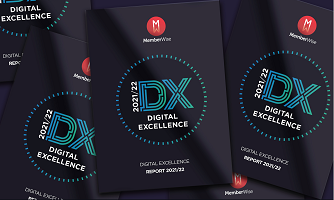MemberWise has recently released its latest Digital Excellence report and as usual, the document provides valuable insight into our sector. It analyses the current status of digital activities in the membership and association sector, puts metrics around key areas and suggests a path of best practice for those wishing to excel.
Platform versus proprietary solutions
The report creates an interesting dynamic between the increased use of platform-based CRMs and the growing dissatisfaction with the effectiveness of current CRM solutions. It goes on to propose a move away from this terminology altogether and the suggested change to “Association Management System” (AMS) resonates well with me. Protech has often found the term “CRM” to be overly narrow in scope when applied to all the challenges our systems aim to solve for the membership sector. We have chosen to retain it thus far because of the recognition it has amongst clients and because the classical definition of the term is broader than it might initially appear. These definitions suggest that CRM is more than just a platform and should instead be a suite of solutions that serves the entire customer experience.
The report indicates a clear appetite for platform-based solutions, with Microsoft Dynamics gaining its largest market share since 2018. Interestingly however, satisfaction is currently on the decline with only 29% of users reportedly likely to remain with their current provider; down by 34% from 2018. Additionally, just 29% would recommend their current provider and only 31% would recommend their current solution (down by 14% and 16% from 2018 respectively). We have to wonder whether falling satisfaction and the move to platform-based solutions are related trends.
The key challenge is still member engagement
The primary challenge for membership organisations continues to be member engagement, despite 53% of respondents claiming to be actively measuring it. So why is this still such a concern? One reason might be that the top member engagement measurements being used are either macro level statistics or relatively simple direct feedback from the member. These types of engagement include the number of webinars attended, online member surveys, email click-throughs, website visits, social media interactions and number of publications subscribed to. While these are all good sources of information, they do not properly reflect the far richer behavioural data set that should be possible from a successful CRM solution.
The report also indicates that digital tools such as learner management solutions are being increasingly deployed with the sector moving forward by “3 to 5 years”. That this development is not delivering a better picture of member engagement suggests that technical and economic factors are restricting the integration of “big data”’ into platform CRMs.
It is no surprise that automations focused on engagement were described as lacking in the report. Finding time, even for value-added tasks is difficult, and so the importance of automating member administrations mentioned within the report shouldn’t be underestimated. However, if an organisation’s CRM system does not provide a detailed engagement history at the record level for each member, automating these key processes or driving further personalisation will be impossible. One reason why this contact-level data capture might prove so difficult is the constraint placed on it by platform-based CRMs that often have hidden costs associated with capturing data at scale.
Capitalising on learner management
Learner management solutions can have a significant impact on member engagement so it was encouraging to see a 12% increase in online learning across the sector. While this can provide a massive opportunity, capitalising upon it demands an excellently implemented solution. Learner management tools are a rich source of engagement data providing that the information is centralised and categorised into positive/negative engagement metrics. Without this it is impossible to truly understand whether the deployment of those tools is moving the organisation closer to its objectives. Every effective digital strategy should prioritise harvesting the outcomes of these solutions and feeding conclusions back into the overall member value proposition.
The importance of personalisation
With the challenges of capturing enough data to track member engagement effectively, it is no surprise that the sector also continues to struggle with delivering a personalised online experience. This is a vital area in which organisations desperately need to improve if they are to retain members and increase member value. Currently however, the approach to personalisation is quite basic.
The most alarming statistics include the low prevalence of using location-based data (31%) and member persona segments (24%) to achieve personalisation. This highlights the two primary obstacles to delivering personalisation effectively.
- Lack of data to use for personalisation:
Do organisations know what their members are doing and are they able to react? Taking Amazon as an example, every single click can affect the personalisation that a user experiences. - Member portals restricting integration and access to content:
The member portal approach to integration has offered a cost-effective approach to achieve a joined-up user experience. But at what cost to personalisation? If an organisation’s data and content are not linked, this is a barrier.
Integration, data and analytics
The key to overcoming many of the challenges listed in the report lies in the effective integration of systems. Unfortunately, only 28% of respondents currently have achieved this within their critical systems. This figure is likely to fall even further if digital technologies continue to be deployed without combining them to create an effective value proposition. Effective digital strategies need to detail the key data that will enable more engagement and personalisation, and then identify the steps required to get there. Only by doing this will organisations be able to select the right CRM solution and deploy it effectively enough to maximise their engagement and member value.
Are you looking to embark on a digital transformation but don’t know where to start? Download Protech’s e-book, Practical strategies and actions for a successful digital transformation project here
 Protech was founded in 1994 to help membership organisations, associations and professional awarding bodies to increase engagement, enhance customer relationships and improve their operational efficiency. After more than 20 years of growth, we are proud to still be motivated by the same essential vision and still be supporting some of the country’s leading organisations to achieve more.
Protech was founded in 1994 to help membership organisations, associations and professional awarding bodies to increase engagement, enhance customer relationships and improve their operational efficiency. After more than 20 years of growth, we are proud to still be motivated by the same essential vision and still be supporting some of the country’s leading organisations to achieve more.









Leave A Comment